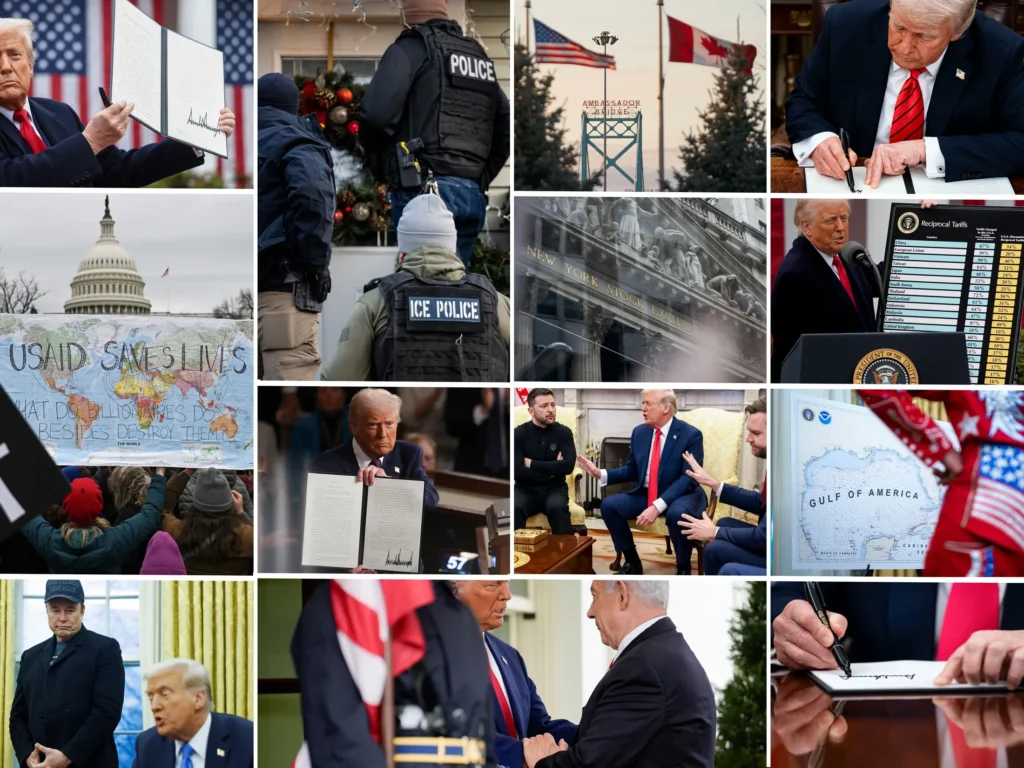The United States of America President Donald J. Trump has completed his first one hundred days in office in his second non-consecutive term on April 29, Tuesday amidst continuing global disorder over his chaotic policies — unilateral tariffs hike, failure to establish peace in Gaza with Israeli killing spree continuing unabated and the U.S. economy is yet to adjust to the turbulence in the global economy set off by Trump’s very own moves.
The first one hundred days of the Trump administration witnessed many flip-flops in the process of implementation of the tariff policy. Trump has blinked first in his battle with China in the trade war between the two largest economies of the world, but still China has not officially sent representatives for talks. Trump’s stance towards the Chinese President Xi Jinping is softer now. There is every possibility of back-channel discussions before a formal meeting with Xi is held. Trump advisers expect to get more than fifty countries consent for trade negotiations with the U.S. within the 90-day pause period, which expires in the first week of July. So far 21 countries, out of the total of 180 trade partners, have agreed to negotiate trade terms.
How are the American people looking at the last 100 days of Trump? Excepting his MAGA supporters who are solidly behind him and taking the present disorder as the necessary evil before the establishment of the new order, there are widespread protests against Trump. Major cities of the U.S., including New York, San Francisco and Chicago, saw massive demonstrations against Trump’s MAGA policies and indiscriminate deportation. What was significant was that the opposition Democratic Party had little role in leading such massive protests. Different interest groups, including trade unions as also women’s organisations, took the leading part. Socialist senator Bernie Sanders gave the lead in many demonstrations.
The disquieting aspect for Trump is that in the recent opinion polls, Trump’s approval rating was noted between 39 and 44 per cent which, according to the American analysts was the lowest compared to the other presidents after the completion of 100 days in office. Joe Biden was at 54 per cent and Barack Obama was at 62 per cent after the completion of their first 100 days. Does it mean that Trump’s popularity is sinking?
No, the position is more complex. Trump is a bit of a gambler both in economic policies as also in political moves. But he is active in fact hyperactive, continuously working on something novel, which will appeal to the U.S. people. This dip in his rating after 100 days may surge if he can achieve success in his trade diplomacy after July this year and prove to the American people and the trading partners that there is no way any country can prosper in the global trade without U.S. support.
The American people have also seen that he is the only President who took up immediately the task of bringing truce in Gaza and Ukraine. These are delicate and time-consuming process but Trump has been trying to bring Russian and Ukraine presidents in a summit for facilitating the process of truce. Trump is scheduled to attend the Victory Day celebrations in Moscow on May 9. Both Trump and Putin might talk more about bringing to an end to the war in Ukraine, even as the European Union members are inciting President Zelenskyy to recklessly continue the war against Russia.
As regards Europe, Trump has alienated completely the European Union members. Excepting Hungary, he has no supporter. But since his inauguration in January 20 this year, his attacks against European nations, especially France and Germany, have not helped the far right parties in those countries. In the recent elections in Germany, the position of Trump and his acolyte Elon Musk in favour of the far right AFD, strengthened the centre right and helped the CDU/CSU leader Frederick Merz to win and eventually form the coalition government with the Social Democrats and the Greens, keeping away the second largest party AFD from power. Trump campaign failed in Germany, and German nationalism won for the time being.
On April 28, national elections were held in Canada which witnessed the big win of the ruling Liberal Party headed by Mark Carney, the running Prime Minister. Only three months ago, the ruling Liberal Party was trailing big time in the opinion polls against the Conservative Party, which was known to be pro-Trump. Trump’s address before the elections to the Canadians to convert their country into the 51st state of the USA and enjoy all privileges fired up residual Canadian nationalism. The Conservatives paid the price for being pro-Trump. In the last few weeks, the Conservative leader Piero Poilievre tried to distance away from Trump, but that was too late. The Liberal Party reaped the advantage of Canadians’ nationalist political sentiments.
While the present global turbulence will continue involving the U.S., China and the EU and their respective stance will continue to differ on the Ukraine war issue, for India, the most immediate issue is the decision Trump will be taking if PM Narendra Modi goes for serious military action against Pakistan as a retaliation over Pahalgam massacre that took place on April 22, exactly seven days before the completion of one 100 days of Trump. This is crucial for India because, all the countries have strongly condemned the Pahalgam massacre and extended support to India, but they have not mentioned anything supporting Indian contention that Pakistan was behind it.
Let us analyse Trump’s position on Pahalgam massacre from day one. On April 22 itself, Trump and US Vice-President J. D. Vance who was in India on the fateful day, empathetically supported India. That was taken as sort of unequivocal support to the Indian position by the government officials here. But later, Trump changed his stance to a more neutral gear when he said that there have always been tensions on the border, but the two countries would figure it out. In the last two days, the US state department has constantly called on India and Pakistan to see reason and work on easing the tensions.
Trump is in the habit of talking in superlatives. He exaggerates. But it seems that he is ready to help India up to a point without endorsing large scale military intervention which some of the ruling establishment officials are talking of. That way the U.S. intel chief Tulsi Gabbard’s comment is more important. She said: ‘”America stands with India as it hunts down those responsible for the heinous Pahalgam attack.”
The moot point is that in the present global situation, Trump will not like another war between India and Pakistan, whatever may be the US president’s personal liking for his dear friend Narendra Modi. But certainly, India can persuade the U.S. to put tremendous pressure on the Pakistan government to destroy the terror camps and take immediate action against the terrorists, who operate from Pakistan against India. Indian intelligence must have the list of such terror camps. The CIA also must have. This is the immediate option available to India by using good offices of both Trump and Tulsi Gabbard.
Pakistan is demanding the setting up of an international investigation to probe the Pahalgam massacre. China and some other countries have supported it. For obvious reasons, India cannot agree to this as it will help in internationalising the Kashmir situation. The limited action of destroying the terror camps has to be the priority, either by actions taken by the US, or by Indian forces with the U.S. endorsement. Trump is a transactionalist. He might seek some big deals for the U.S. business for support to India as he clinched with President Zelenskyy about Ukraine’s mineral resources.
In any case, India has few options. In the last eleven years of Modi rule, the foreign policy has been tuned to cultivate the USA as the only friend. Russia is sulking as in the current trade negotiations with the USA, in many areas of defence imports, Russia is being replaced. Six months have passed since Prime Minister Modi invited President Vladimir Putin on October 22 last year at Kazan for visiting India, but no dates have been set yet. China is now interested in improving its relations with India. But its foreign office spokesperson talked of supporting Pakistan in protecting its sovereignty on April 28.
Prime Minister and his advisers have to look for the best option to hit back at Pakistan with the U.S. endorsement and also toleration by China. As Trump completes one hundred days in office, Prime Minister Narendra Modi also gets a chance to prove how this friendship can be effectively used in meeting the challenge of cross border terror backed by Pakistan. (IPA Service)

 Private Sector Capex May Dip 25% To Rs 4.88 Lakh Crore In FY26
Private Sector Capex May Dip 25% To Rs 4.88 Lakh Crore In FY26 